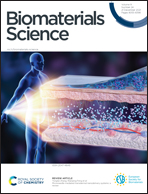A lithium-doped surface inspires immunomodulatory functions for enhanced osteointegration through PI3K/AKT signaling axis regulation†
Abstract
The response of immune systems is crucial to the success of biomedical implants in vivo and in particular, orthopedic implants must possess appropriate immunomodulatory functions to allow sufficient osteointegration. In this work, lithium (Li) is incorporated into titanium (Ti) implants by plasma electrolytic oxidation to realize slow and sustained release of Li ions. In vitro cellular behaviors of mice bone marrow derived macrophages (BMDMs), including gene expression, cytokine secretion, and surface marker analysis suggest that a low dose of Li incorporation could enhance the recruitment of BMDMs, restrict pro-inflammatory polarization (M1 phenotype), and promote anti-inflammatory polarization (M2 phenotype). The in vivo air pouch implantation model is constructed to simulate the microenvironment associated with aseptic loosening and the histology results confirm that a small dose of Li could relieve inflammatory reactions surrounding the implants. Moreover, compared to the Li-free group, the macrophage-conditioned culture medium (MCM) from Li-doped samples is more beneficial for the osteogenic differentiation of the mouse embryo cell line (C3H10T1/2) and angiogenesis of human umbilical vein endothelial cells (HUVECs), which is further confirmed by better osteointegration ability in the bone implantation model of Li-incorporating Ti implants. Furthermore, the molecular mechanism study discloses that osteoimmunomodulatory activity of Li-incorporating Ti implants is achieved by regulating the cascade molecules in the PI3K/AKT signalling pathway. This work reveals that favorable immune-modulated osteogenesis and osseointegration of bone implants can be realized by the incorporation of Li which broadens the strategy to develop the next generation of immunomodulatory biomaterials.



 Please wait while we load your content...
Please wait while we load your content...